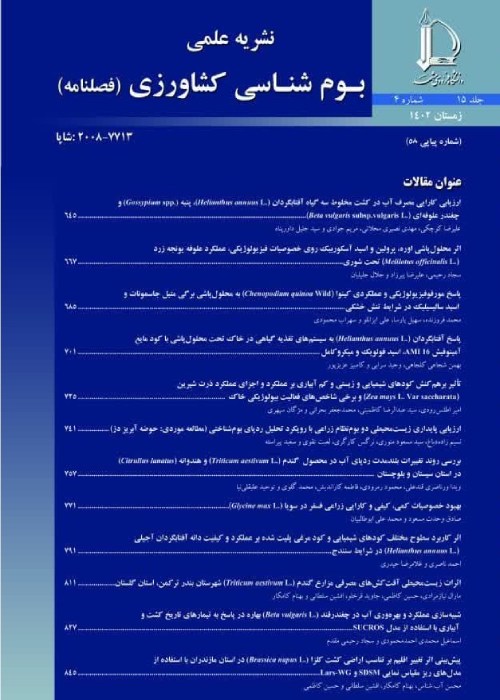Fenugreek (Trigonella foenum-graecum L.) Landraces Response to Biochar Application under Deficit Irrigation
Biochar which is producing by thermal decomposition of organic material under limited supply of oxygen and relatively low temperatures, produces with the intent to be applied as a technique for improving soil properties. Adding biochar to the soils boosts soil fertility and improves the porosity, moisture, cation exchange capacity, pH, and development and reproduction of microbes in the long term. Research indicated that biochar potentially enhanced soil water holding capacity. This infers that soil amendment with biochar may improve crop productivity by retaining more water from rainfall in arid regions and reduce the frequency/amount of irrigation water in irrigated regions. Currently there is no logical method to increase precipitation during drought periods, therefore using drought resistance cultivars and appropriate agricultural techniques are the best solution to deal with this problem. Using soil amendments like biochar to increase water retention has been considered for a long time to decrease the drought effects. This study aimed to assess the effect of biochar on growth and yield of fenugreek landraces under deficit irrigation.
To assess the effect of biochar on growth and yield of fenugreek landraces under deficit irrigation, a field experiment was conducted in 2015 at the Agricultural Biotechnology Research Institute of Iran, Karaj, Iran. Six branched fenugreek landraces including Dezful, Shushtar, Ardestan, Rehnan, Yazd, and KhomeyniShahr were treated by biochar application and non-application under 2 different irrigation intervals. A split plot factorial experiment in a randomized complete block design with three replications was used. Each plot had the size of 4 m × 2.5 m with a plant density of 40 plant m-2. Biochar was derived from rice husk at 500°C in an oxygen depleted environment. Biochar application rate was calculated based on bulk density for the 30 cm layer of the soil (8:92 v/v) and added to the top layer of the soil. Increasing irrigation interval from 4 to 8 days applied from 50% of flowering stage. Seeds were sown on May 10th and mature plants were harvested on November 11th. Plant height, number of main and secondary branches, as well as yield and yield components were measured. Statistical analyses were done using SAS (9.2) software.
According to the results, assessed traits were not significantly affected by triple interaction effect of treatments and also double interaction effect of landrace and biochar. But biochar application increased the number of main and secondary branches, 100-seed weight, and seed yield on 4- days irrigation interval by 19.75, 18.13, 17.54, and 24.33%, respectively and on 8-days irrigation interval by 2.61, 19.52, 8.67, and 26.66%, respectively. Moreover, increasing irrigation interval decreased plant height by 22.42, 22.01, 27.23, 13.66, 27.13, 26.62%; the number of main branches by 6.18, 7.92, 31.84, 16.66, 24.22%, 32.97%; the number of secondary branches by 40.54, 39.09, 40.99, 39.83, 40.89, 40.88%; 100-seed weight by 20.43, 8.70, 17.22, 26.98, 26.44, 23.11%; and seed yield by 61.20, 47.55, 50.12, 44.71, 38.44, 46.24% in Dezful, Shushtar, Ardestan, Rehnan, Yazd, and KhomeyniShahr landraces, respectively. However, the number of pods plant-1 and seeds pod-1 were not significantly affected by interaction effects of treatments. Several studies showed the reduction of crop growth and production under water deficit. Baradaran et al. (2013) also indicated increase in irrigation intervals decreased plant height, the number of pods, the number of seeds pod-1, and thousand-seed weight in fenugreek. This results are due to increase in allocation of photosynthetic material to roots than shoot resulting in smaller plants with less leaf area as a key factor in receiving solar radiation, water and energy exchange, and biomass production. Several studies reported increased water holding capacity by biochar addition because of its high adsorption capacity and porous structure. Akhtar et al. (2014) also reported that addition of biochar increased the soil moisture content in deficit irrigation which consequently improved physiology, yield and quality of tomato compared with non-biochar control.
In conclusion, adding biochar at a concentration of 7-8% to a loamy soil reduced the effect of water deficit on fenugreek growth and seed yield. Biochar increase seed yield by increasing seed weight rather than the number of pods plant-1 and seeds pod-1.
- حق عضویت دریافتی صرف حمایت از نشریات عضو و نگهداری، تکمیل و توسعه مگیران میشود.
- پرداخت حق اشتراک و دانلود مقالات اجازه بازنشر آن در سایر رسانههای چاپی و دیجیتال را به کاربر نمیدهد.



